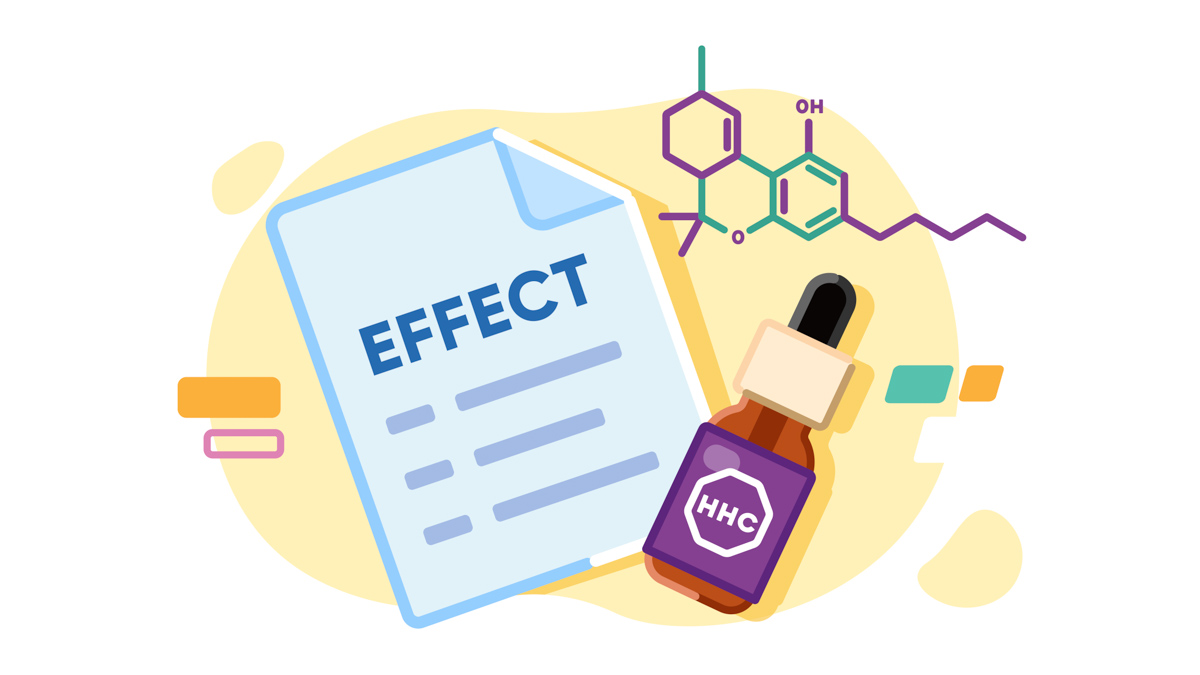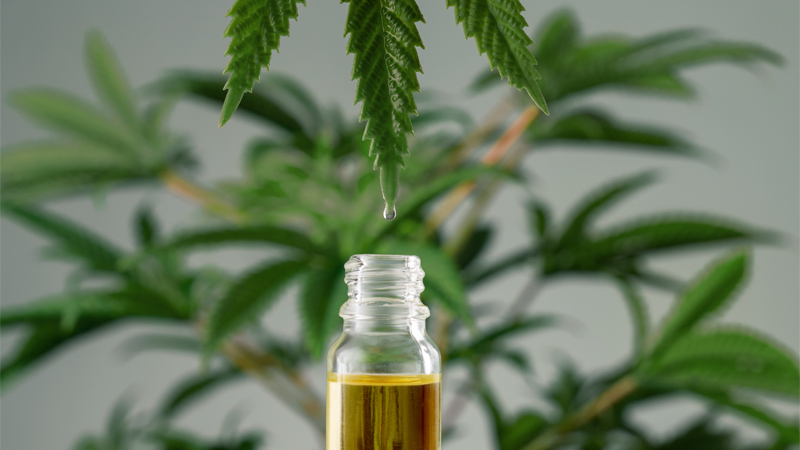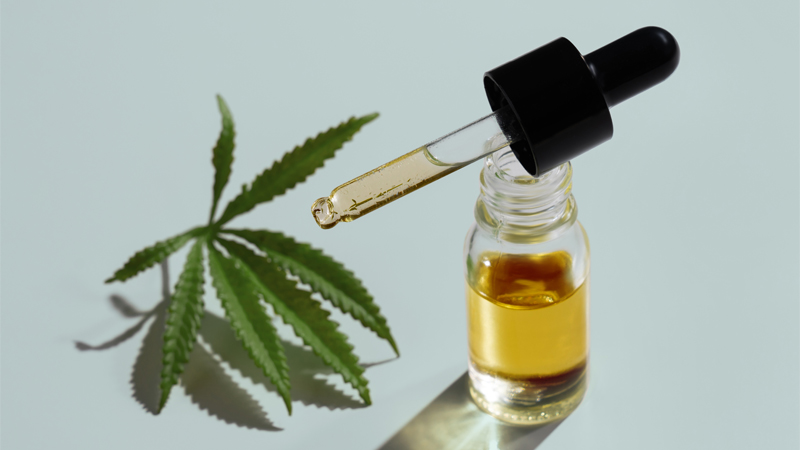What Are the Effects of HHC?

This article presents what we know about HHC and its effects on the body and brain. We elaborate on the chemical structure of HHC, compare it to delta-9 THC and other isomers, and shed light on its safety profile. After reading this article, you’ll know how to use HHC responsibly while getting the most bang for your buck — and learn where to look for high-quality HHC products.
With cannabinoid advancements at full speed, alternatives to commonly known delta-9 THC and CBD start popping up fast.
HHC effects are similar to delta-9 THC according to anecdotal evidence. Some people also claim it doesn’t show up on a drug test — but we can’t confirm that.
HHC is also more stable than THC, making it more resistant to heat, UV light, and oxidation — HHC products don’t degrade as fast as regular weed.
Here’s what you need to know about HHC effects, its legality, and where to find it.
What is HHC (Hexahydrocannabinol)?
HHC stands for hexahydrocannabinol – a hydrogenated form of THC.
Hydrogenation is exactly what you’re thinking it is; a similar process that margarine manufacturers use to hydrogenate seed oils and make them look like butter.
HHC occurs in hemp and marijuana, but only in trace amounts. To extract a usable amount, manufacturers turn to a sophisticated process that saturates THC with hydrogen atoms under high pressure and uses a catalyst like palladium or nickel.
This process affects THC’s double-bond chemical structure and places hydrogen instead of it. However, that doesn’t change the cannabinoid’s potency and effects.
Not only does the effects of HHC last longer than delta-9 THC, but it’s also less prone to degrading due to UV light, oxidation, and heat exposure.
How Does HHC Work in the Body?
HHC activates the same cannabinoid receptors — CB1 and CB2 — as delta-9 THC. Therefore, it can get you high.
These receptors belong to the endocannabinoid system (ECS), the master regulatory network that works to promote and maintain homeostasis (balance) in your body.
The potential use of HHC isn’t limited to its psychoactive effects. You can also reap several health benefits from this cannabinoid, but we’ll get to that later in the article.
First, let’s answer another burning question.
Is HHC Natural?
Yes, HHC is a naturally occurring cannabinoid, but the way how it’s made is not-so-natural.
Like I said, there’s not enough HHC in mature hemp and marijuana plants to make direct extraction cost-efficient.
Manufacturers saturate THC with hydrogen and use specialized catalysts to obtain usable amounts of HHC. That’s done in a laboratory, so one can argue whether or not HHC is extracted naturally.
This little inaccuracy causes legal troubles in some states, even though HHC is federally legal.
HHC Effects
Though HHC has been around for some time, there’s still not enough research on its effects. The majority of cannabinoid research investigates the properties of THC and CBD.
Judging by my own experience, as well as from anecdotal reports I’ve found online, HHC and THC have similar effects, including:
- Mood elevation
- Feelings of euphoria
- Increased appetite
- Heightened senses
- Muscle relaxation
- Slowed reaction time
- Reduced nausea
- Relief from physical discomfort
Because HHC operates on the same cannabinoid receptors, many experts believe that it carries the same therapeutic potential. However, more studies are needed until we can draw definitive conclusions.
HHC Side Effects
Despite not being clinically studied, HHC seems to have a similar safety profile to THC.
The side effects of HHC resemble those of other psychoactive cannabinoids:
- Anxiety and paranoia
- Sedation
- Dry mouth
- Dry, red eyes
- Low blood pressure
- Lethargy
- Dizziness
- Problems with coordination
- Short-term memory loss
Whether or not you experience these side effects — and how severe they are — depends on the dosage.
HHC Dosage

The optimal dose for any psychoactive cannabinoid depends on a few individual factors, such as your weight, age, metabolism, gender, and tolerance levels.
If you’re new to HHC, you might want to test your tolerance first, but the rule of thumb is that the potency of HHC is the middle ground between delta-8 and delta-9 THC.
Always start with baby steps until you know how your body responds to HHC.
Common dosage tiers for HHC include:
- Low tier: 10-20 mg per serving
- Mid tier: 20-50 mg per serving
- High tier: 50-100 mg per serving
If you’re a seasoned user, taking a similar or slightly higher dose will be a good place to start.
You may also want to try microdosing by taking 1-2 mg of HHC every few hours to slowly adjust to its psychoactive potential and prevent tolerance from building too quickly.
Is HHC Legal?
The problem with HHC is that it’s federally legal, but several states have already challenged the federal regulations.
Long story short, HHC remains in a legal gray area.
According to some vendors, HHC is legal because it’s a naturally occurring compound, and the end product doesn’t contain more than 0.3% delta-9 THC.
However, the commercially available concentrations of HHC aren’t achieved naturally. In addition, the Drug Enforcement Administration (DEA) has recently clarified its stance on HHC and other analogs, claiming that “all synthetically derived tetrahydrocannabinols remind Schedule I controlled substances.”
It’s up to individual states to determine whether HHC is legal or not within their jurisdictions.
HHC is illegal in:
- Arizona
- Arkansas
- Idaho
- Illinois
- Iowa
- Mississippi
- Nevada
- North Dakota
- Utah
- Washington
States where HHC is heavily regulated (and most likely illegal):
- Alaska
- Colorado
- Delaware
- Hawaii
- Kentucky
- Rhode Island
- Vermont
Does HHC Show Up on Drug Tests?
HHC has two key selling points.
One is that the cannabinoid has a longer shelf life than THC, making it less prone to degradation over time.
That’s a fact.
The other one is that HHC won’t appear on a drug test, which is the most luring pitch.
But that’s a lie.
For now, there are no scientific studies to support this claim; it remains just anecdotal evidence. If you need to take a drug test soon, be sure to abstain from HHC until you pass it.
Where to Buy HHC

The main problem with HHC is that there isn’t a standard protocol testing for potency and purity yet. This, in turn, creates obvious safety issues for consumers.
I wouldn’t risk buying HHC locally because most HHC products available in local stores come without current certificates of analysis (CoAs).
When you buy HHC online, not only can you look into the CoAs, but you can also read customer reviews and cannabis forums to learn as much about the vendor and its products as possible. This way, you can make a well-thought-out decision on your purchase.
Buying HHC online also gives you access to better deals thanks to regular discounts, reward programs, and subscription orders.
HHC Effects FAQ
How long does HHC take to kick in?
It’s difficult to answer this question definitively, but as with THC, the onset of HHC effects depends on the consumption methods.
When you vape or smoke HHC, the effects will probably kick in within minutes from your last puff. That’s because HHC enters the bloodstream through the lungs, avoiding the first-pass metabolism in the liver.
If you take edibles, the effects will take hold with a slight delay because HHC must pass through your digestive system.
How long does HHC last in your system?
There are no studies on the duration time of HHC effects. However, people report that the effects last longer than that of other forms of THC.
The time HHC metabolites need to leave your body depends on your diet, age, weight, metabolism, and physical activity level.
What’s the difference between HHC and delta-8 THC?
Some users say HHC and delta-8 THC produce similar effects, but HHC tends to last longer and focus more on the body than delta-8 THC.
What’s the difference between HHC and delta-9 THC?
The effects of HHC are slightly milder than those of delta-9 THC. The latter is also incomparably better researched in terms of its medical uses and safety. Similar to delta-9 THC, HHC can get you anxious and paranoid in large doses.
What’s the difference between HHC and delta-10 THC?
HHC seems to be stronger than delta-10 THC. Delta-10 is the least potent of all THC isomers, so it’s a better pick if you’re just getting started with psychoactive cannabinoids.
Key Takeaways on HHC Effects
HHC is a natural cannabinoid. However, it requires synthetic catalysts and the use of laboratory equipment to be made in usable quantities.
The effects of HHC are similar to delta-9 THC. Both cannabinoids can get you high, but HHC is anecdotally less potent than delta-9.
That means it theoretically comes with fewer and less intense side effects. Whether that’s true or not is up for discussion; we need more clinical studies on humans regarding the effects and safety of HHC.
If you’re looking for high-quality HHC products, we recommend finding a reputable online store. Buying HHC online equals lower baseline prices, regular discounts, and more products to choose from.
Always ask for batch-specific CoAs to make sure your products contain the declared amount of HHC and are free from common contaminants like pesticides, heavy metals, and the said catalysts.